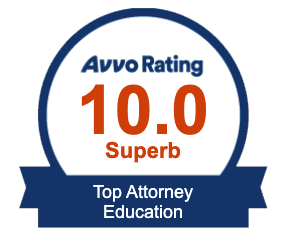This is the fourth and last post in a series of posts on Children with ADHD and Special Education and IEPs. I have attempted to outline and summarize some of the most important issues that parents face in public schools when their child is diagnosed with ADHD or ADD. I am sure I have not answered every question about how to address every educational challenge for a child with ADHD. I will leave it to you to follow up with me or other professionals who can provide assistance, advice, information, and advocacy for your child.
This last post on ADHD will address some of the strategies the school system can employ for a child with ADHD. These strategies are not exhaustive. In other words, there are many proven strategies to address the educational needs of children with ADHD that I have not cited below. It is likely no one intervention, strategy, or aid may be adequate for your child. It is usually a combination of strategies, interventions, and aids that prove to be helpful in addressing your child’s educational needs. Of course, every child is different. Some children may respond to well-tested intervention for children with ADHD while other do not. And there are sometimes issues of using medications to improve your child’s behavior, concentration, and ability to organize among other things. Medical decisions should be made by competent and experienced physicians in the field of ADHD. If your child is administered medication(s) for his or her ADHD, then you should become aware of the side effects of the medication(s). You should inform the IEP team or Section 504 team what medication(s) are prescribed by your physician and the side effects of the medication(s). This is critical information. Without such information, your child’s teachers will not be able to fully understand the reasons for your child’s behaviors, and learning and testing abilities and performance. But for now, here are some commonly used strategies for behaviors issues for your child with ADHD.
Strategies for Behavior Management for ADHD
Suggestions for accommodating child with ADHD:
- Closer teacher supervision
- more frequent positive reinforcement to stay on task
- Shorter assignments
- preferential seating
- assigning study buddy
- teacher initiated reminders about work and materials to be brought to and from school
- supplying specially marked folders to store work
- feedback in form of a point accrual system or token programs for academic performance
- positive social reinforcement
- Response cost behavior modification programs
- paying attention, completing class work, cooperating with classmates, raising one’s hand before speaking, neatness of work.
- Academic Contingency Management and Cognitive-Behavioral
Contingency management and academic interventions are more effective than cognitive-behavioral interventions for improving classroom behavior. Cognitive-behavioral interventions are effective for enhancing academic performance.
When task related attention or disruptive behavior is targeted, contingency management (token reinforcement or cost response) and academic interventions (peer tutor) are preferred over cognitive-behavior modification strategies(problem solving training).
Myths and Realities of ADHD
About 20% of children with ADHD do not respond positively to Ritalin. Great variation in children’s response to stimulant medication such Ritalin.
Token reinforcement and response cost are most widely studied classroom-based treatments for children with ADHD. Individual children vary in their response to these strategies.
- Positive reinforcement alone is not sufficient for acquiring and maintaining appropriate behavior
- Myth that ADHD is a disorder of self-regulation. Interventions should focus on training students with ADHD to regulate own behavior. Research on cognitive behavioral interventions has not supported use of these interventions for students with ADHD.
- ADHD must limit educational performance and the need for special education services must be demonstrated.

